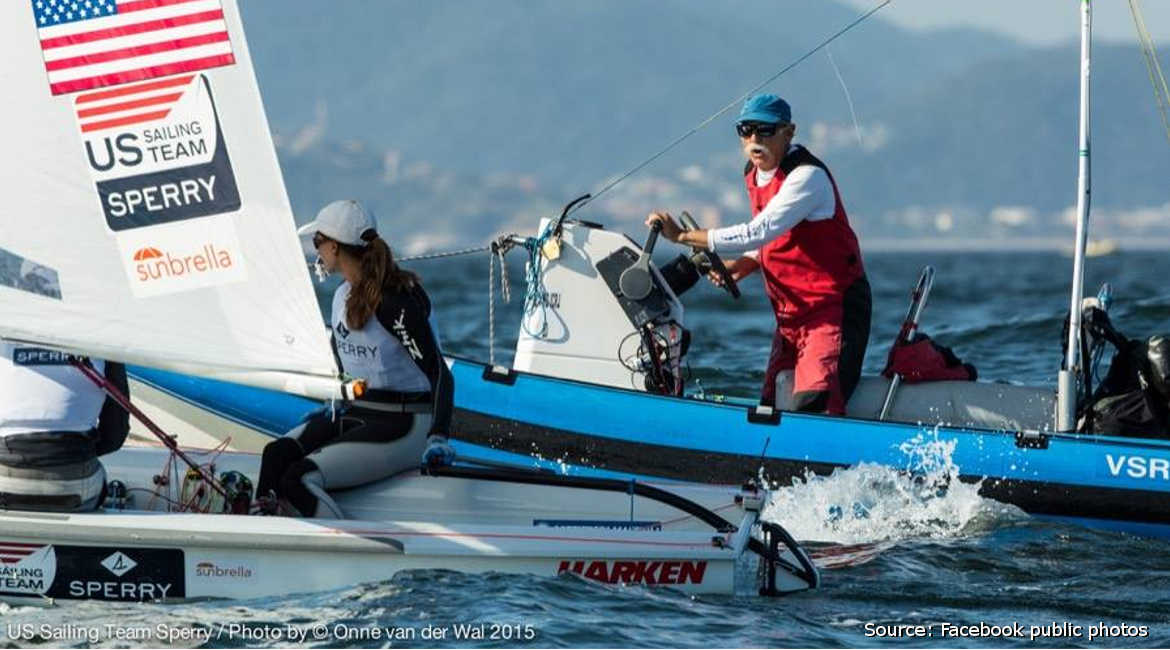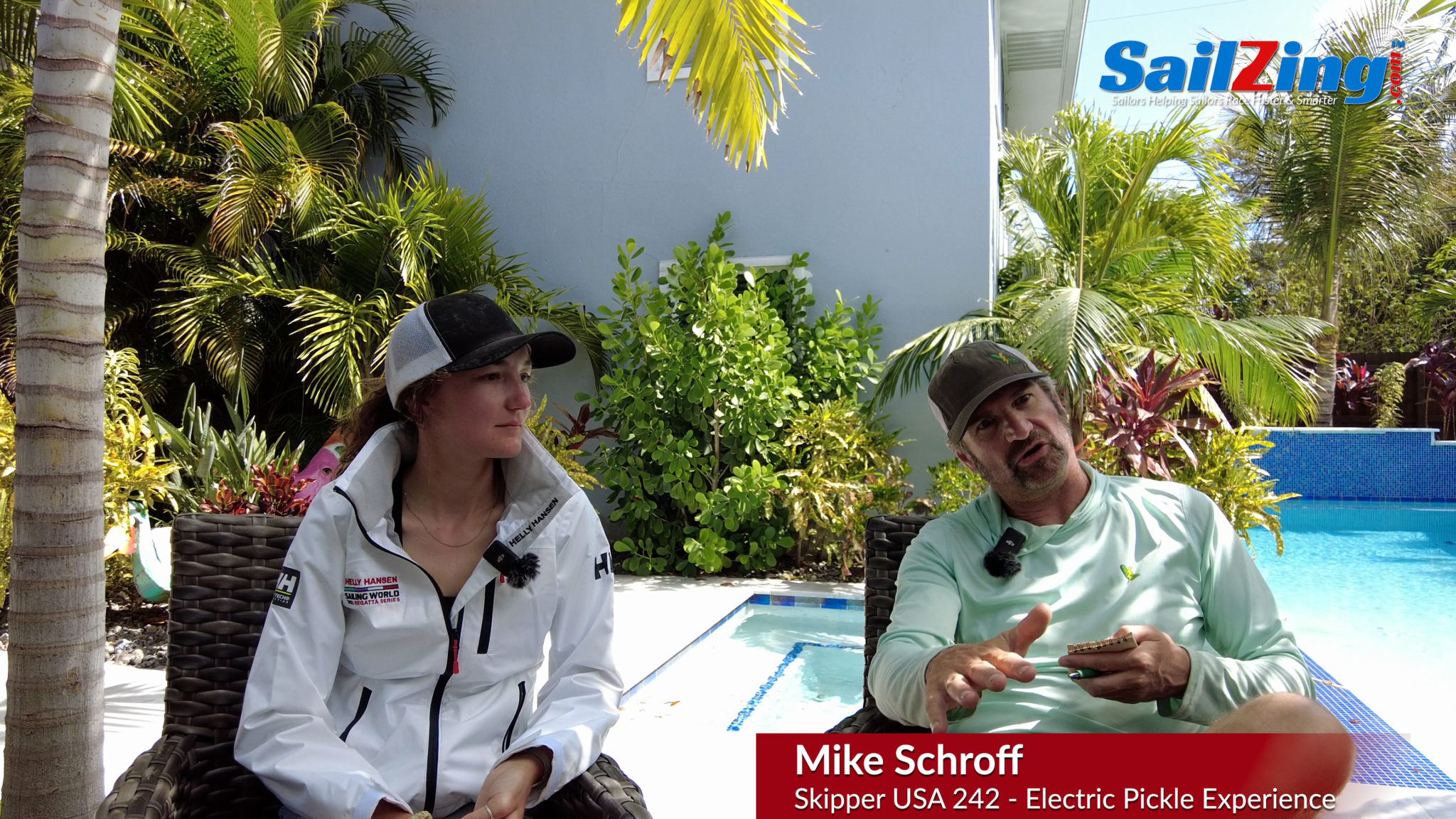
Dave won three 470 world championships with his crew Tom Linskey and he credits his “total faith in (Tom’s) ability to handle tactics, which allowed (Dave) to focus on making the boat go fast”.
Upwind
In general, when sailing upwind, the skipper is in charge of boatspeed, with the crew playing a mechanical role in that part, mainly handling the jib. The skipper also deals with boat-to-boat tactics. The crew is normally in charge of big-picture tactics as well as keeping tabs on the compass—headers and lifts—and velocity changes. For instance, let’s say you’re sailing on port tack approaching a group of starboard tackers. The crew tells the skipper what they should do—either go behind the group and set up on the group’s weather hip or tack ahead and to leeward of the group and lead them to a header or area of better velocity. The skipper then figures out where to place the boat to make it happen.
This is the division of duties that Dave thinks works well, but each team has to honestly consider their strengths and adjust accordingly, considering personalities and experience.
Next, the team needs to focus on getting so familiar with their duties that they become second nature. Recently, my brother Jeff Hudson and I were talking about skipper / crew communications in the C-Scow. The best crews can anticipate when a tack is likely to happen based on traffic, laylines, headers, etc and will have their hands on the controls to make the tack without needing to be told. As the tack begins, the crew can feel the turn and jump to action. As Dave says, “your senses tell you how the boat is going. If you don’t have to concentrate on physically sailing the boat, you can concentrate on the chess game that is happening around you”.
Downwind
In boats such as the 470 (or 420, E-Scow, A-Scow etc.) that includes a jib and spinnaker, Dave shares this downwind guidance.
Downwind, the roles are clear and fixed, because flying the spinnaker is a full-time job for the crew. A good downwind crew never knows where they are on the course. They might be able to spare a glance every two minutes or so to see where the other boats are, but in between those, they shouldn’t have any idea what’s going on and must have total faith in the skipper’s ability to put the boat in the proper place. While the crew deals with the spinnaker, the skipper becomes the eyes of the boat, watching the compass for shifts and keeping an eye out for velocity changes.
Onboard Conversation
Dave shared some great examples of concise, precise exchanges using consistent terminology might sound:
There’s very little talking except to alert your partner to expect something. Upwind, you might hear Annie tell Bri, “Going good. Nice call on that shift.” Or, “Need a little more report on the compass.” Or she might ask, “What do you see for pressure ahead?” It’s important to make comments precise, accurate and brief. That’s something we’re always working on. Comments need to be a minimum of words because, in the heat of battle, the person you’re talking to only hears a part of what you’re saying.
With a good team, they won’t be discussing how the boat is being sailed. They shouldn’t have to do so at this stage. There will be nothing like “We need to sail the boat flatter” or “Bring the jib in a bit more.”
When Things Go Wrong
When things go badly, the crew’s job is to keep the skipper’s head in the hunt or get it back there. I can understand how skippers can take mistakes hard, since they are ultimately responsible. Dave Ullman has some tips:
The right words of encouragement do a lot to keep the skipper from getting into that psychological place where he or she can no longer focus. Sometimes you can do that by setting smaller, achievable goals, such as, “Let’s get the boat in front of us.” The crew can also highlight what’s working, even though it might not be a huge game-changer. For instance, pointing out that, “We just gained on that last tack” can help set the stage for even more positive outcomes. By the same token, the crew can also provide key information about point standings in the regatta. I can’t tell you how many times I have seen a team leading a regatta throw it all away on a flyer because they got behind in one race, when all they had to do was pass two or three boats to still be in it. When it’s going badly, the skipper especially must be more focused and concentrate even harder. The crew can help make that happen.
The original article can be found on Sailing World here.
Related Content:
Sailing World – Doublehanded Dynamics by Dave Ullman
Dave Ullman on Sailing World
Ullman Sails
Ullman Sails Facebook
Sailors Helping Sailors
Will you share your knowledge with your related Comments below?



